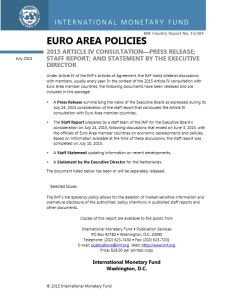Join getAbstract to access the summary!

Join getAbstract to access the summary!
International Monetary Fund
Euro Area Policies
IMF, 2015
What's inside?
Negative medium-term externalities threaten a promising euro-zone recovery.
Recommendation
While macroeconomic conditions in the near term augur a recovery in the euro zone, the medium-term outlook is less upbeat, according to this authoritative and reasonably accessible report from the International Monetary Fund. The aftermath of the recession and the ongoing machinations of the Greek crisis threaten more robust growth and employment across the region. Policy makers will need to continue their concerted efforts to put the economy on a sustainable path. getAbstract recommends this influential recap to executives doing business in the euro zone.
Summary
About the Author
The International Monetary Fund advises member nations on policy issues and works to promote economic stability and well-being.



































Comment on this summary